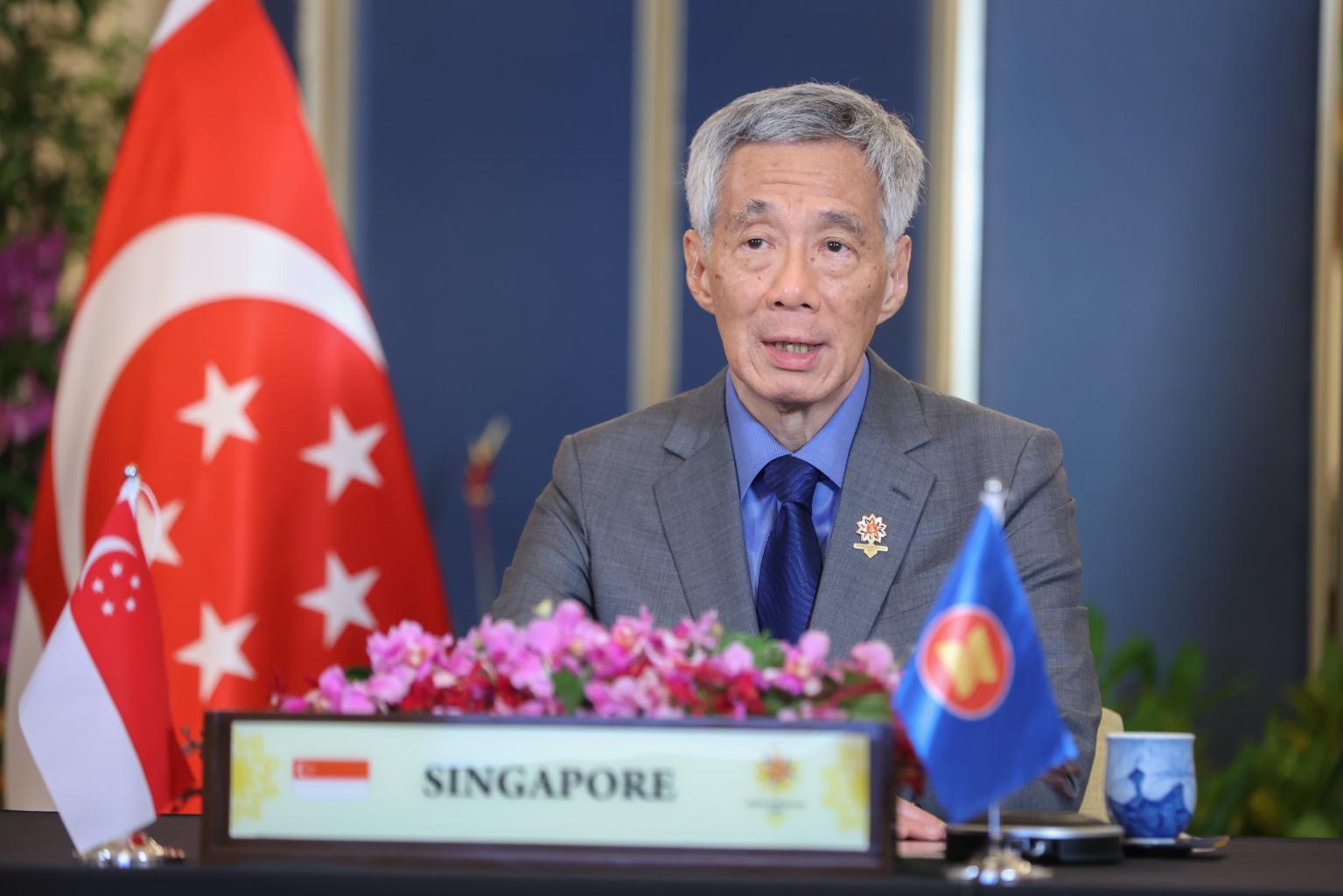Conducive strategic environment, stability key to countries' Covid-19 recovery, says PM Lee
Sign up now: Get ST's newsletters delivered to your inbox

Prime Minister Lee Hsien Loong speaking at the East Asia Summit on Oct 27, 2021.
PHOTO: MCI
Justin Ong
Follow topic:
SINGAPORE - As Asean and its partners adapt to live with Covid-19, they will only be able to fully recover within a conducive strategic environment, Prime Minister Lee Hsien Loong told an annual gathering of 18 leaders from across the region on Wednesday (Oct 27).
Speaking at the East Asia Summit, he noted that amid the continued challenges of major power competition and geopolitical tensions, Singapore is heartened by the commitment shown by the regional bloc's external partners in upholding Asean centrality and cooperating with its platforms.
Wednesday's evening forum, which capped the second of three days of virtual meetings, assembled Asean's member states and eight key partners - Australia, China, India, Japan, New Zealand, Russia, South Korea and the United States - in a group representing more than half the world's population and over 60 per cent of its gross domestic product.
"We hope that new security arrangements will contribute constructively to regional peace and stability," said PM Lee.
Earlier in the day, Australian Prime Minister Scott Morrison had assured his counterparts at the Asean-Australia summit that the three-way defence pact signed in September between his country, Britain and the United States - dubbed Aukus - would reinforce Canberra's commitment and backing for an Asean-led regional architecture.
The partnership, which will supply Canberra with nuclear-powered submarines, has raised concerns among some Asean countries over its potential to stoke an arms race while intensifying US-China rivalry in the region. Aukus is widely seen as a riposte to growing Chinese assertiveness in the South China Sea in particular.
On Wednesday, Japan's new Prime Minister Fumio Kishida, in his first appearance at these high-level Asean meetings, also pledged at the Asean-Japan summit to work with the bloc to ensure a free and open Indo-Pacific with an emphasis on freedom of navigation and resolution of disputes in line with international law.
Describing US-China relations as a factor for peace and prosperity, PM Lee said at the East Asia Summit: "Countries in the region want to have good relations with both, the US and China, and do not wish to take sides."
He welcomed the recent high-level exchanges between the US and China, and added: "We hope that the US and China will work out a modus vivendi that will enable cooperation in areas of common interest, even as they engage in healthy competition in other areas."
PM Lee also noted that on the South China Sea, Singapore's position is well-known and consistent.
"As a non-claimant state, we do not take sides on competing territorial claims, but being a small nation dependent on trade for survival, we have fundamental interests at stake: to maintain peace and stability in one of the world's busiest waterways; to uphold the right of all states to freedom of navigation and overflight; and to support the peaceful resolution of disputes in accordance with universally recognised principles of international law, including the 1982 UN Convention on the Law of the Sea (Unclos)," he said.
"Singapore hopes that all parties will work towards maintaining dialogue, preserving regional peace and stability, and ensuring that actions are in line with international law."

Prime Minister Lee Hsien Loong speaking at the East Asia Summit on Oct 27, 2021. The summit assembles Asean's member states and eight key partners - Australia, China, India, Japan, New Zealand, Russia, South Korea and the United States.
PHOTO: LIANHE ZAOBAO
He also suggested three areas in which Asean and its eight partners could work together towards holistic recovery from the pandemic.
Support for vaccine multilateralism was one, as PM Lee highlighted Singapore's commitment to fair and equitable access to Covid-19 inoculation for all countries as co-chair of the Friends of the Covid-19 Vaccine Global Access (Covax) Facility.
Covax aims to secure vaccines for people in poorer countries, but the initiative has suffered logistical difficulties and supply shortages.
WIth 84 per cent of its population fully vaccinated, Singapore has donated its Covax allocation to other countries. It has also donated its share of funds for procuring jabs under a regional resource pool to the Asean Secretariat and other member states.
PM Lee also stressed the need for countries to work together to emerge stronger economically.
The Regional Comprehensive Economic Partnership (RCEP) will boost confidence in regional trade and investment, and contribute towards post-pandemic recovery, he said. The RCEP is the world's largest trade pact, involving the 10 Asean nations plus Australia, China, Japan, New Zealand and South Korea.
The deal was concluded last year but needs the ratification of at least six Asean signatories and three others. Singapore was first to ratify RCEP in April 2021. "Participating countries should thus swiftly ratify the RCEP to enable its entry into force by January next year, as targeted," PM Lee urged.
He then called for stronger cooperation in digitalisation and the use of information and communication technology. "To reopen our borders and restore travel safely, we should develop interoperable digital solutions, such as the mutual recognition of digital health certificates," PM Lee suggested.
He pointed to the Asean Smart Cities Network, which aims to use technology and urban planning to build a sustainable future across the region, as an avenue for sharing experiences.
Cyber resilience across the countries can also be improved by conducting capacity-building programmes, including through the Asean-Singapore Cybersecurity Centre of Excellence located in the Republic, said PM Lee.

